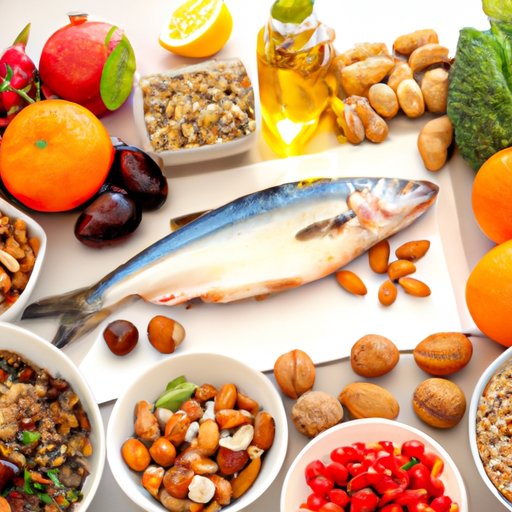Introduction
The Mediterranean diet is a way of eating that is based on the traditional cuisine of countries in the Mediterranean region such as Italy, Greece, and Spain. It emphasizes the consumption of fresh, minimally processed foods such as fruits and vegetables, whole grains, nuts and legumes, olive oil, dairy products, fish and seafood, herbs and spices, and moderate amounts of red wine. This style of eating has been linked to numerous health benefits including improved heart health, reduced risk of chronic diseases, and weight loss. In this article, we will explore the staples of a Mediterranean diet and provide tips for incorporating them into your everyday meals.
Exploring the Staples of a Mediterranean Diet
Fruits and vegetables are an essential part of the Mediterranean diet. They should be eaten in abundance and can include both fresh and frozen varieties. Fruits and vegetables are rich sources of vitamins, minerals, antioxidants, and fiber, all of which are essential for optimal health. Whole grains such as oats, barley, quinoa, and brown rice should also be included in your diet. Whole grains are packed with important nutrients such as B vitamins, iron, magnesium, and zinc.
Nuts and legumes are another staple of the Mediterranean diet. They are excellent sources of plant-based protein, healthy fats, fiber, and essential minerals. Olive oil is the primary source of fat in this style of eating. It is high in monounsaturated fatty acids, which have been shown to reduce inflammation and improve heart health. Dairy products such as cheese, yogurt, and milk should also be included in your diet, but in moderation. These foods are rich in calcium, vitamin D, and other important nutrients.
Fish and seafood are an important part of the Mediterranean diet. They are rich sources of omega-3 fatty acids, which are essential for optimal health. Herbs and spices such as oregano, basil, rosemary, garlic, and turmeric should also be included in your diet. These flavorsome ingredients not only add flavor to dishes, but they also contain antioxidants and other beneficial compounds.

A Guide to Shopping for Mediterranean Foods
When it comes to shopping for Mediterranean foods, there are a few things to keep in mind. The best place to shop for fresh produce is at your local farmers market or grocery store. Look for seasonal fruits and vegetables that are local and organic whenever possible. When it comes to whole grains, nuts, and legumes, look for minimally processed options such as steel cut oats, raw almonds, and dried chickpeas. For dairy products, opt for low-fat versions and try to buy organic when you can. When it comes to fish and seafood, look for wild-caught varieties whenever possible.

Creating a Meal Plan Based on a Mediterranean Diet
Creating a meal plan based on a Mediterranean diet is a great way to ensure that you are getting all the essential nutrients your body needs. A typical day on a Mediterranean diet may include breakfast of oatmeal with berries, lunch of a salad with grilled fish, and dinner of roasted vegetables with quinoa. Snacks can include nuts, yogurt, and fruit. To get started on creating your own meal plan, it can be helpful to use online resources such as recipe books and meal planning apps.

Recipes for a Delicious and Nutritious Mediterranean Diet
One of the best ways to enjoy a Mediterranean diet is to incorporate delicious recipes into your meal plan. There are plenty of recipes available online that make it easy to cook up nutritious meals. Here are some examples of Mediterranean-inspired recipes to get you started:
Breakfast Recipes: Greek Yogurt Parfait with Honey and Nuts, Avocado Toast with Feta and Tomatoes, Mediterranean Omelet with Spinach and Feta.
Lunch Recipes: Grilled Vegetable and Hummus Wrap, Mediterranean Chopped Salad with Chickpeas, Tuna Nicoise Salad.
Dinner Recipes: Grilled Salmon with Lemon and Herbs, Eggplant Parmesan, Roasted Vegetable and Quinoa Bowl.
Snack Recipes: Baked Zucchini Chips, Roasted Chickpeas, Apricot Walnut Energy Bites.
How to Incorporate Mediterranean Foods into Your Everyday Diet
Incorporating Mediterranean foods into your everyday diet doesn’t have to be difficult. Start by making small changes such as swapping out white bread for whole wheat or replacing sugary snacks with nuts and fruits. Try to fill half your plate with fruits and vegetables at each meal and choose lean proteins such as fish, chicken, and beans. Lastly, don’t forget to include healthy fats such as olive oil and nuts. With a few simple swaps, you can easily create delicious and nutritious meals that are inspired by the Mediterranean diet.
Conclusion
The Mediterranean diet is a style of eating that is based on the traditional cuisine of countries in the Mediterranean region. It emphasizes the consumption of fresh, minimally processed foods such as fruits and vegetables, whole grains, nuts and legumes, olive oil, dairy products, fish and seafood, herbs and spices, and moderate amounts of red wine. This style of eating has been linked to numerous health benefits and can easily be incorporated into your everyday diet. By using recipes and meal plans, it is easy to create delicious and nutritious meals that are inspired by the Mediterranean diet.
By following the guidelines of the Mediterranean diet, you can enjoy the many health benefits associated with this style of eating. Not only will you be consuming nutrient-dense foods, but you will also be able to experience the unique flavors and aromas of this vibrant cuisine.
(Note: Is this article not meeting your expectations? Do you have knowledge or insights to share? Unlock new opportunities and expand your reach by joining our authors team. Click Registration to join us and share your expertise with our readers.)
